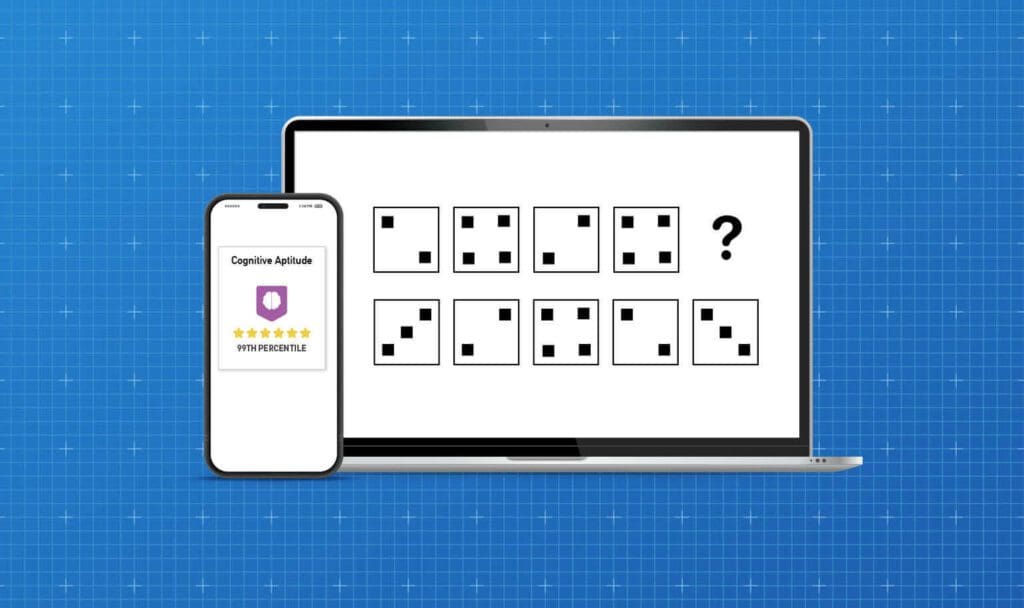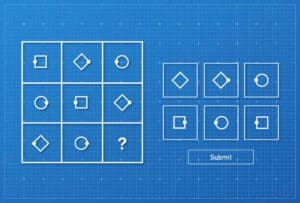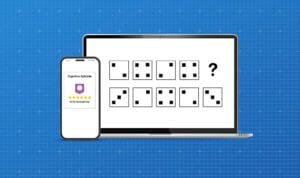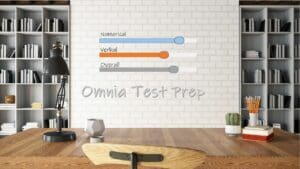Welcome to the #1 free practice hub for the Criteria Cognitive Aptitude Test (CCAT).
- Take a free 30-question CCAT sample test, with a score report that will analyze your performance.
- Enroll in free and paid prep courses to understand every aspect of the test.
- Get answers to ALL the frequently asked questions about the test, including CCAT scores.
Free CCAT Practice Test
Go ahead and take our Free CCAT practice test, which includes 30 questions and has a time limit of 9 minutes.
What is the Criteria Cognitive Aptitude Test?
The Criteria Cognitive Aptitude Test (CCAT) is a popular pre-employment cognitive ability test that follows the concepts of classic cognitive ability tests. Preparing for it in advance can increase your performance dramatically.
- Length: 15 minutes
- # of questions: 50
- Topics: numerical, verbal, abstract/spatial, attention to detail
- Calculator: not allowed
There are many different question types on this test. If you want to do well, you must practice each of those topics separately, mastering the different techniques and learning how to solve them faster. Let’s quickly go over the different sections and question types:
Numerical Reasoning
You can expect three types of questions.
- Number series
- Word problems
- Fraction value
Verbal Reasoning
You can expect three types of questions:
- Antonyms
- Analogies
- Sentence completion
- Assumptions & conclusions
- Seating arrangements
Abstract Reasoning
You can expect three types of questions:
- Shape series
- Matrices
- Odd-one-out
Attention to detail
Another question type will ask you to spot duplicates in sets of data. These sets can be simple lists of names/places and they can also be pairs of shapes.
50 Questions in 15 minutes?! ?
Yes, that is quite an intimidating amount of questions to be solved in 15 minutes. But once you understand how the test works, you’ll see it’s not as bad as it sounds. Firstly, you’re not expected to actually solve all 50 questions. Secondly, once you start practicing and getting used to the question styles and time constraints, you will notice how things start to become clear.
In a nutshell, the CCAT test is not about getting it RIGHT, it’s about getting it DONE. That is, if you acknowledge that some of the questions on the test cannot be solved in short time frames, and you allow yourself to skip them, you’ll be able to progress through the test and pick more questions that fall under your strengths. It takes some practice to master this skill and to tune your brain into the right mode, but I assure you that with practice comes success.
Criteria Cognitive Aptitude Test – Understand How Scores Work
As with any cognitive ability test, when you complete a Criteria Cognitive Aptitude Test, your raw score is comprised of the number of questions you answered correctly, with no points being taken off for choosing the wrong answer. This raw score is then converted into a percentile score which compares you to other candidates who took the test. In the case of the CCAT, the average score is 24/50. Thus, if you score 24, you’ll score higher than 50% of the population of candidates who took the test before you.
On their website, Criteria Corp provides insight into different raw scores per different job positions:
Here are some examples of raw scores and their respective percentile scores:
| Raw score (# of correct answers) | Percentile score (above what % of the population) |
| 24 | 50 |
| 25 | 53 |
| 30 | 71 |
| 32 | 78 |
| 39 | 92 |
| 42 | 97 |
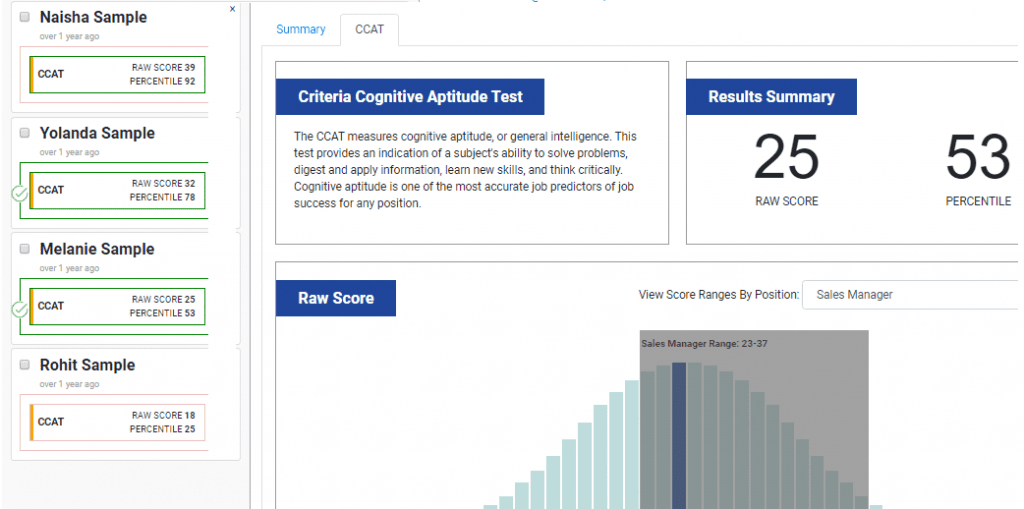
In addition, there are two pages on which more information can be found:
A quick look at the score tables that show up on these pages suggests that for lucrative jobs such as software engineering, banking, and management, one should strive to answer correctly around 30 out of 50 in order to be considered a strong candidate. But other jobs may require average or even slightly below-average scores. Therefore, I strongly recommend that you have a look at the above resources and search for a job description that matches or closely follows the one you’re applying for. That will already help you set yourself a goal while practicing for the CCAT. You can also consider asking the employer about a passing score. And remember, getting closer to the desired score can take a few attempts and might require drilling into certain topics to brush up on your skills. The good news is that each practice session brings you closer to your maximum score potential.
If you wish to learn more, head over to an article that expands on the topic of scores in cognitive ability tests.
Must-read Criteria Cognitive Aptitude Test Tips
I have dedicated a series of blog articles to CCAT tips. I strongly recommend reading them. they’re not too long and will pack you with more insights toward the test.
Take a CCAT Cram Course
Maximize your score potential
Join over 7,500 candidates who’ve taken my CCAT cram course and maximized their score potential. Rated 4.7/5
Nice to meet you! I am Gideon, Founder at 12 Minutes
My prep courses have been taken by over 150,000 candidates.
I know pre-employment cognitive ability tests inside out and I am passionate about helping you succeed on the Criteria Cognitive Aptitude Test. Join the discussion below if you have any questions, or simply use the chatbox on the bottom right corner.
Answers to Frequently Asked Questions About the CCAT
What is the average score on the CCAT?
According to this official sample score report PDF, a candidate who answered correctly 24 out of 50 questions on the Criteria Cognitive Aptitude Test scored in the 50% percentile, which represents the average score.
How can I find the CCAT cutoff score for my job?
The last page of this official sample score report PDF by Criteria Corp includes a table with recommended cutoff ranges for a variety of jobs. While it is not certain to what extent your employer will follow this table’s ranges, it definitely gives you a good estimate of the score range you should aim for to be successful in your assessment.
Is there negative scoring on the CCAT?
No, there is no negative scoring on the CCAT, which means you need to mark an answer for each and every question in the test, even if it means taking a guess. Doing this might get you a few more correct answers to the total raw score.
What is On-Demand Assessment™?
On-Demand Assessment™ appears to be Criteria Corp’s online testing platform, to which candidates are sent to complete their assessments. There are many candidates who search for this term on Google, likely because they’re interested in gaining some insight about what to expect on their test.
Is there an extended CCAT version with more time?
Yes, the CCAT is available in an extended version that is 22 minutes long, instead of 15, i.e. almost 50% more time on the clock. Such test conditions can be made available in two main cases:
- The native language of the candidate is not English.
- The candidate has medical proof of relevant disabilities.
Is the CCAT similar to the UCAT?
The Universal Cognitive Aptitude Test (UCAT), which is also published by Criteria Corp, seems to be a shortened variation of the CCAT. It focuses on math, logic and spatial/abstract reasoning and does not include the verbal part of the CCAT. More on the UCAT here.
What is CrossOver's CCAT test
CrossOver includes the CCAT test in the hiring process. I have an article dedicated to CrossOver’s Aptitude test.
Why do employers use the CCAT in the first place?
The CCAT is widely used by employers, especially in North America. At least according to Criteria Corp, the publishers of the assessment, employers can utilize it in their hiring process in order to cut on hiring and turnover costs and find the following traits among candidates: Critical thinking, Problem-solving skills, Learning ability, Aptitude for applying new information.
Is the CCAT similar to other pre-employment tests?
The CCAT is similar in style to the following tests: Wonderlic, PILI, Logiks General (intermediate), RCAT, Matrigma test
Is the CCAT test hard?
Among similar pre-employment cognitive aptitude tests that are used today, the CCAT is considered a difficult assessment.
- Firstly, its difficulty level increases as you progress towards question 50.
- Secondly, math word problems on the CCAT require a very high level of proficiency, both in terms of calculation speed and information analysis.
- Candidates who have taken the CCAT and also took the Wonderlic test and the PI cognitive assessment reported that the CCAT is the hardest of the three.
Which Employers Use the CCAT in Their Hiring Process?
Here are just some of the employers that use the CCAT in their hiring process:
- Vista Equity
- Tibco
- Applause
- PowerSchool
- Finastra
- CrossOver
Internet Resources on CCAT
I’ve curated every important article about Criteria’s cognitive aptitude tests to save your time. These articles can give you extra insight into how Criteria sells these tests to employers, and more importantly, they give you a sneak peek into sample questions and sample score reports.
- Official CCAT sample questions
- Official CCAT brochure
- Official CCAT sample score report
- This article by The Atlantic talks about the Vista Equity CCAT test, which comprises part of their hiring process.
Take a CCAT Cram Course
Maximize your score potential
Join over 7,500 candidates who’ve taken my CCAT cram course and maximized their score potential. Rated 4.7/5
Disclaimer: 12minprep is not affiliated, nor belongs to Criteria Corp, which are the owners of Criteria Cognitive Aptitude Test (CCAT). This website solely provides information on how to prepare for cognitive ability tests.


